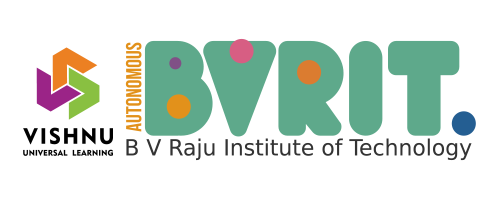UG:
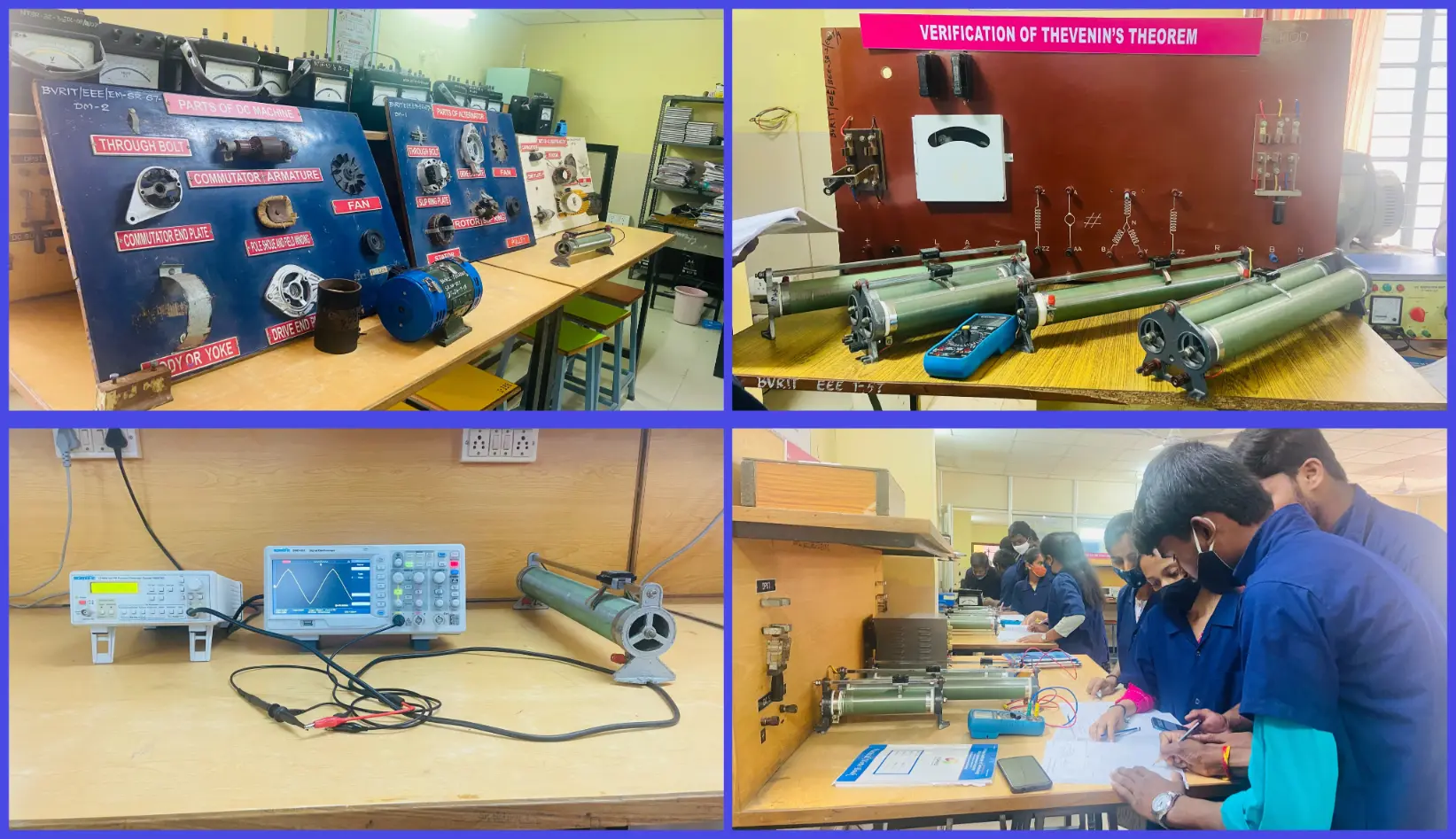
Electrical and Electronics Laboratory is used with the institute core course “Principles of Electrical and Electronics Engineering”. This lab can accommodate about 600+ students in a semester. The lab has fully equipped setup benches to carry out numerous fundamental experiments in Electrical and Electronics Engineering. The experiments are designed to expose students to the practical executions of the fundamental theories of Electrical and Electronics Engineering.
Equipment:
Each experimental bench is equipped with variable AC and DC power supplies with adequate protections, which enables students to carry out the experiments in an “electrically safe environment”. The lab is equipped with demonstrations, voltmeters, ammeters, various size and type of transformers, various types and sizes of motors and generators.
Electrical and Electronics Engineering Lab-I & II
- Digital oscilloscopes.
- Cut Section of DC Shunt Machine.
- Cut Section of Squirrel Cage Induction Motor
- Cut Section of Synchronous Machine With Damper Winding.
- Cut Section of 3-Phase Squirrel Cage Induction Motor with Damper Winding for 2 Speed Operation.
- Regulated power supply – Dual Channel
- Function Generator etc.,
Electrical and Electronics Engineering Lab-III (Principles of Electrical Engineering)
- Computers
- Cut Section of 1.0 HP/220V1500RPM DC Shunt Machine
- Digital oscilloscope
- Rheostats
- Function generators
- Regulated power supply – Dual Channel etc.,
Faculty In-charge: Dr. P Chandra Babu & S Srinivasu, Asst. Profs., EEE.
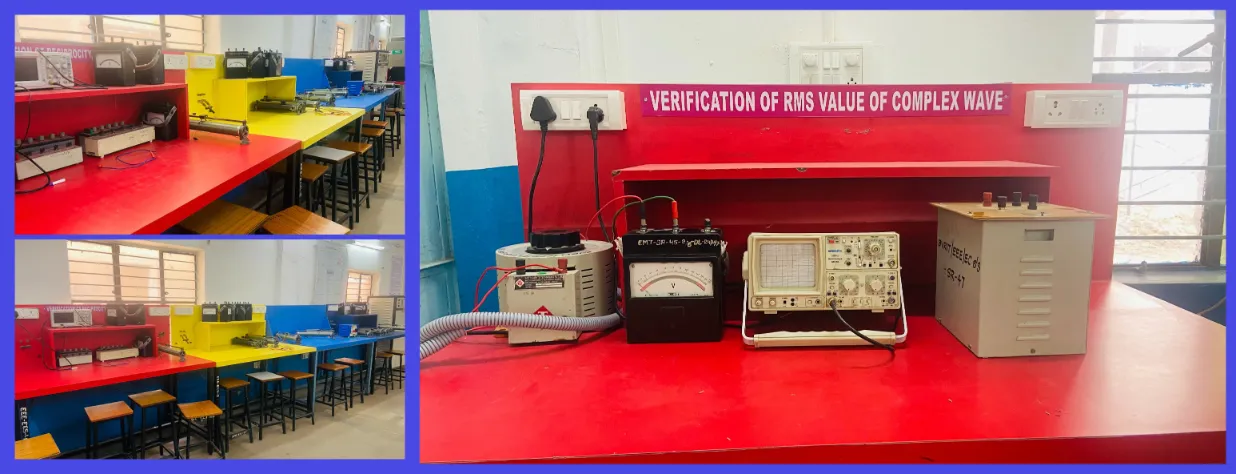
Construction, analysis, and characterization of circuits with student-owned Lab-in-a-Box system. Experiments include: characterization of breadboard back plane wiring; component tolerances; Ohm’s law; Kirchhoff’s laws; series and parallel resistors; voltage and current dividers; mesh-current and node-voltage analysis; superposition and Thevenin equivalents; series RC and RL circuits.
Circuit analysis and design using discrete R, L, and C components, as well as op-amps and transformers, is a fundamental skill for electrical engineers. Using a student-owned analog and digital trainer, a digital multi-meter, and an oscilloscope, the student learns to build and analyze real dc circuits and compare experimental results with theoretical results and computational models.
Equipment:
Each experimental bench is equipped with variable AC and DC power supplies with adequate protections, which enables students to carry out the experiments in an “electrically safe environment”. A primary purpose of this lab course is for you to master the use of electronic test equipment. The devices we will be using include DC power supplies, breadboards, digital multi-meters “DMM”, oscilloscope and a function generator, as well as some resistors, capacitors and inductors, so we can have something to measure-on.
Major Equipment:
- Oscilloscopes
- Regulated Power Supply
- Function Generators
- Rectifier unit
- Load banks
- Computers
- Integrated Chips
- Diodes
- FET
- Measuring Instruments
Faculty In-charge: V Dhanunjaya, Asst. Prof., EEE.
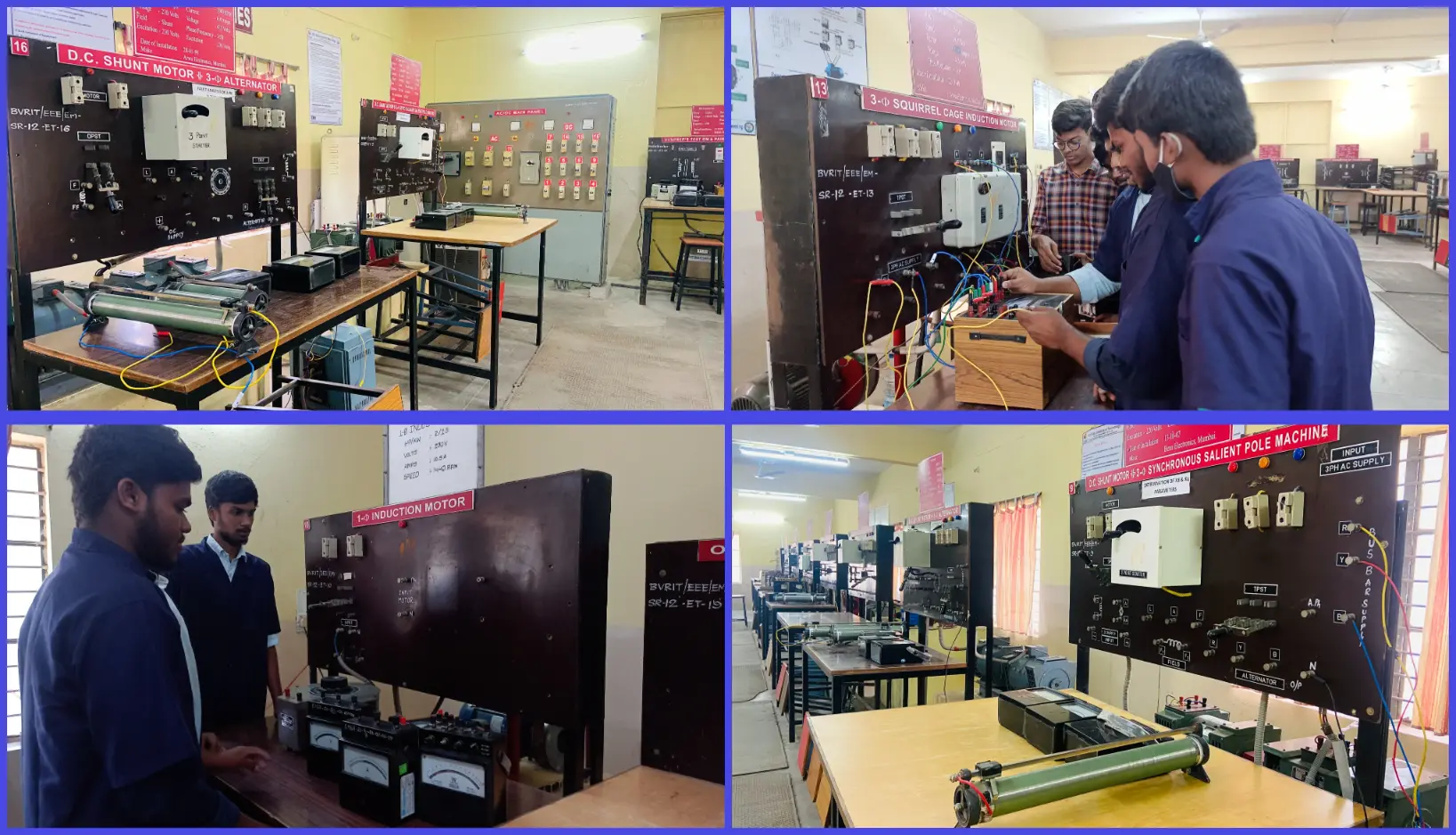
The electrical machines laboratory is equipped with DC machines like DC Motors, DC Generators etc and AC machines like Synchronous Motor, Alternator, Transformer, Induction Motor etc of both single phase and three phase types, industrial type synchronizing panel, etc., enabling our students to work in an industrial environment. The lab facilities are sufficient to conduct experiments as per curriculum and much more relevant experiments. Electrical Machines Lab provides the students with experimental verification of the theoretical concepts studied in the two courses, DC Electrical Machines and AC Electrical machines along with its industrial applications.
Equipment:
This laboratory is equipped with various types of equipment, such as DC generator, AC generator, Induction motor, Capacitor start motor, Capacitor run motor, Tachometer, Three phase power supply, Electro-dynamometers, phase meters, Synchronous machine, DC compound motor, single phase induction motor, three phase induction motor, DC power supply, Transformer, Rheostat, single and three phase voltage regulators, ammeter, voltmeter etc. Using these machines and meters, students mainly perform experiments on finding the machine characteristics and various parameter values.
Electrical Machine Lab-I
- DC Motors (Shunt, Series, Compound)
- DC Generators (Shunt, Series, Compound)
- Load banks
- Rectifier unit
- Measuring Instruments
Electrical Machine Lab-II
- AC Motors (Synchronous, Induction Motors)
- Alternators (Salient and Non-Salient)
- Transformers
- Load banks
- 1-Phase & 3-Phase Auto-Transformers
- Measuring Instruments
Faculty In-charge: Dr. G Naresh Kumar, Asst. Prof., EEE.
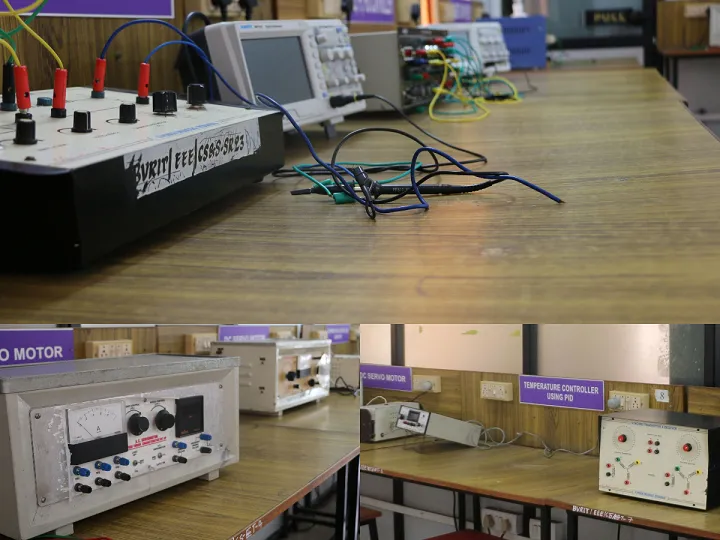
The feedback automatic control systems are an essential feature of numerous industrial processes, scientific instruments and even commercial, social and management situations. A thorough understanding of the elementary principles of this all embracing technology is of great relevance for all engineers and scientists. This laboratory course gives hands-on experience to the feedback automatic control concepts covered in the theory course.
Equipment:
The Control Systems Lab in the Department of Engineering Technology contains a variety of laboratory equipment used in design and experimentation of digital and analog electromechanical feedback control systems. The equipment in this lab include Time response kit, Magnetic Amplifiers, AC & DC Servomotors, Temperature Controller, Synchros, PLC etc.,
- DC & AC Servo motor Trainer Kit
- Synchro- Transmitter & Receiver Kit
- Time response Kit
- Temperature Controller Kit
- P, PI, PID Controller Kit
- PLC Kit
- Magnetic Amplifier Kit
- Digital Oscilloscopes
- Computers
Faculty In-charge: K Hareesh Kumar, Asst. Prof., EEE.
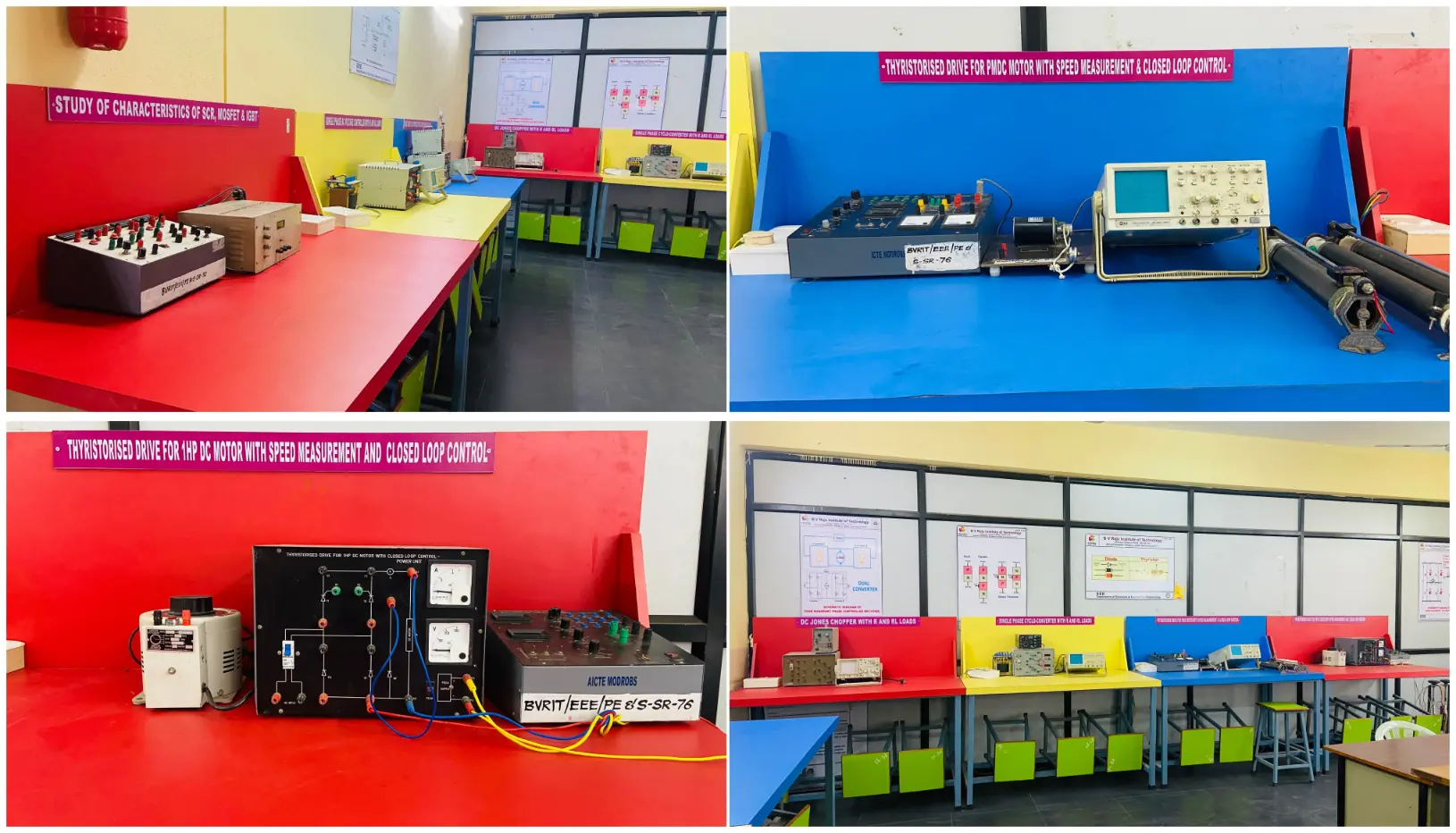
Power electronics is the technology associated with the efficient conversion, control and conditioning of electric power by static means from its available input form into the desired electrical output form.
Power electronic converters can be found wherever there is a need to modify the electrical energy form (i.e. modify its voltage, current or frequency.) With “classical” electronics, electrical currents and voltage are used to carry information, whereas with power electronics, they carry power. Some examples of uses for power electronic systems are DC/DC converters used in many mobile devices, such as cell phones or PDAs, and AC/DC converters in computers and televisions. Large scale power electronics are used to control hundreds of megawatt of power flow across our nation.
Equipment:
The power electronics lab is equipped with the following prominent equipment like Single-phase half converter, Single-phase full converter, Three-phase half wave and full wave converter, Voltage commutated chopper, Current commutated chopper, Series inverter, Parallel inverter, AC voltage controller using SCR and TRIAC, Single-phase cyclo-converter, Cathode Ray Oscilloscope, Function generator, Regulated Power Supply, Digital Storage Oscilloscope etc.,
- Trainer kits
- Digital storage Oscilloscope
- Regulated Power Supply
- 3-Phase Auto-Transformer
- Desktop Computers
Faculty In-charge: Dr. D Gireesh Kumar, Assoc. Prof., EEE.
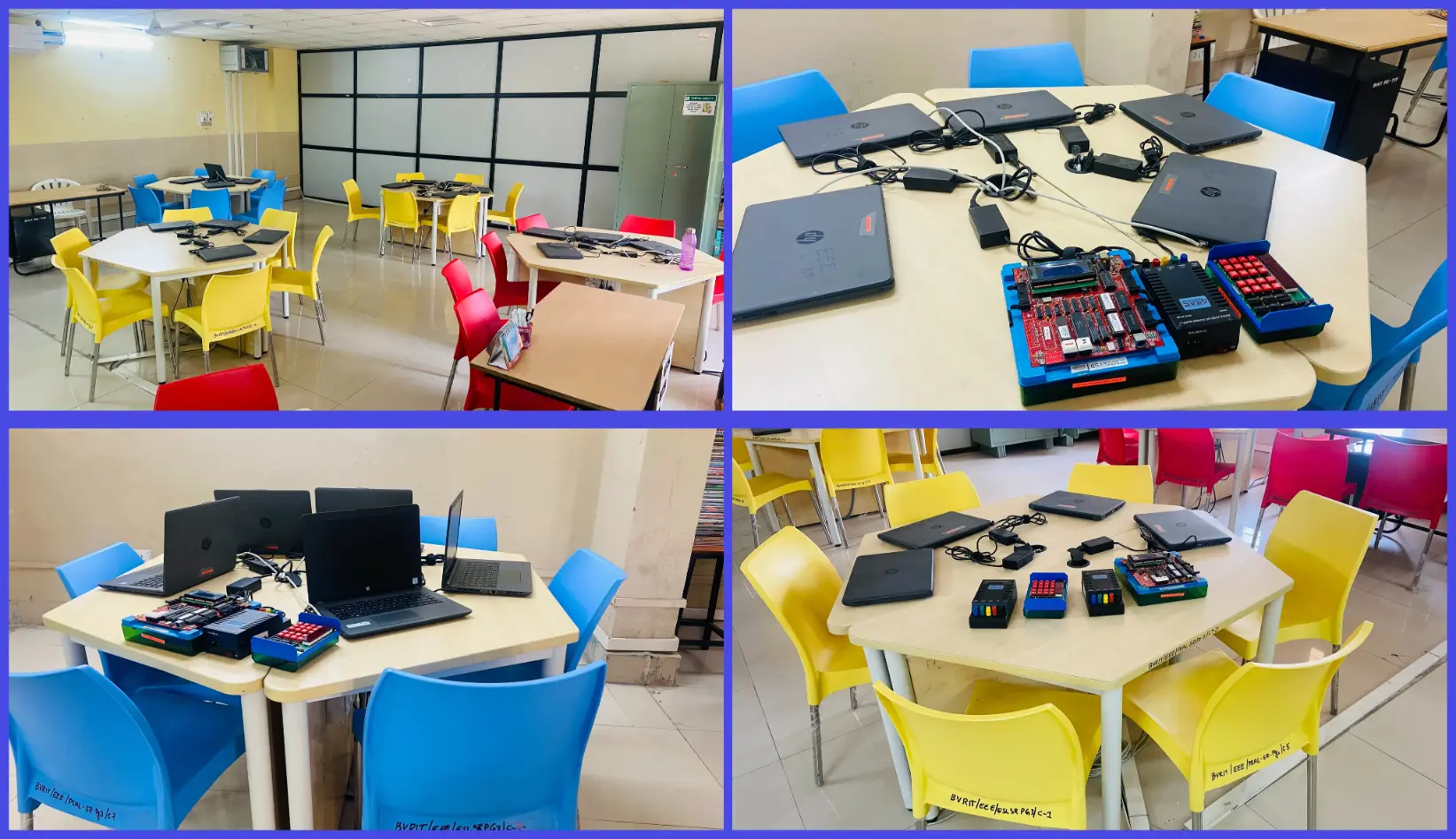
This Laboratory gives a clear exposition on the theoretical aspect of the subject through laboratory demonstration and experimental setup on various topics. Experiments are designed to elaborate the functions of various microprocessors (8085, 8086) and 8051 (micro controller) through software and hardware based experiments. The objective of the laboratory is to enhance the practical knowledge of the students by performing experiments based on logical and arithmetic operations and how to interface memory and other peripherals with processors.
Equipment:
The laboratory is well equipped with 8085 trainer kits and computers are installed with Microsoft Assembler (MASM) and Keil Software. A comprehensive lab manual is also provided in the lab to aid the students to perform the experiments with ease and proper understanding. The experiments included in the curriculum covers all the concepts of programming studied in theory. Some additional value added experiments are also included in the end.
- 8086 Microprocessors trainer kits
- 8051 Micro controller trainer kits
- Interfacing kits & DMA controllers
- Micro controller simulation S/W (KEIL)
- Desktop computers
Faculty In-charge: Dr. P Chinna Dastagiri Goud, Asst. Prof., EEE.
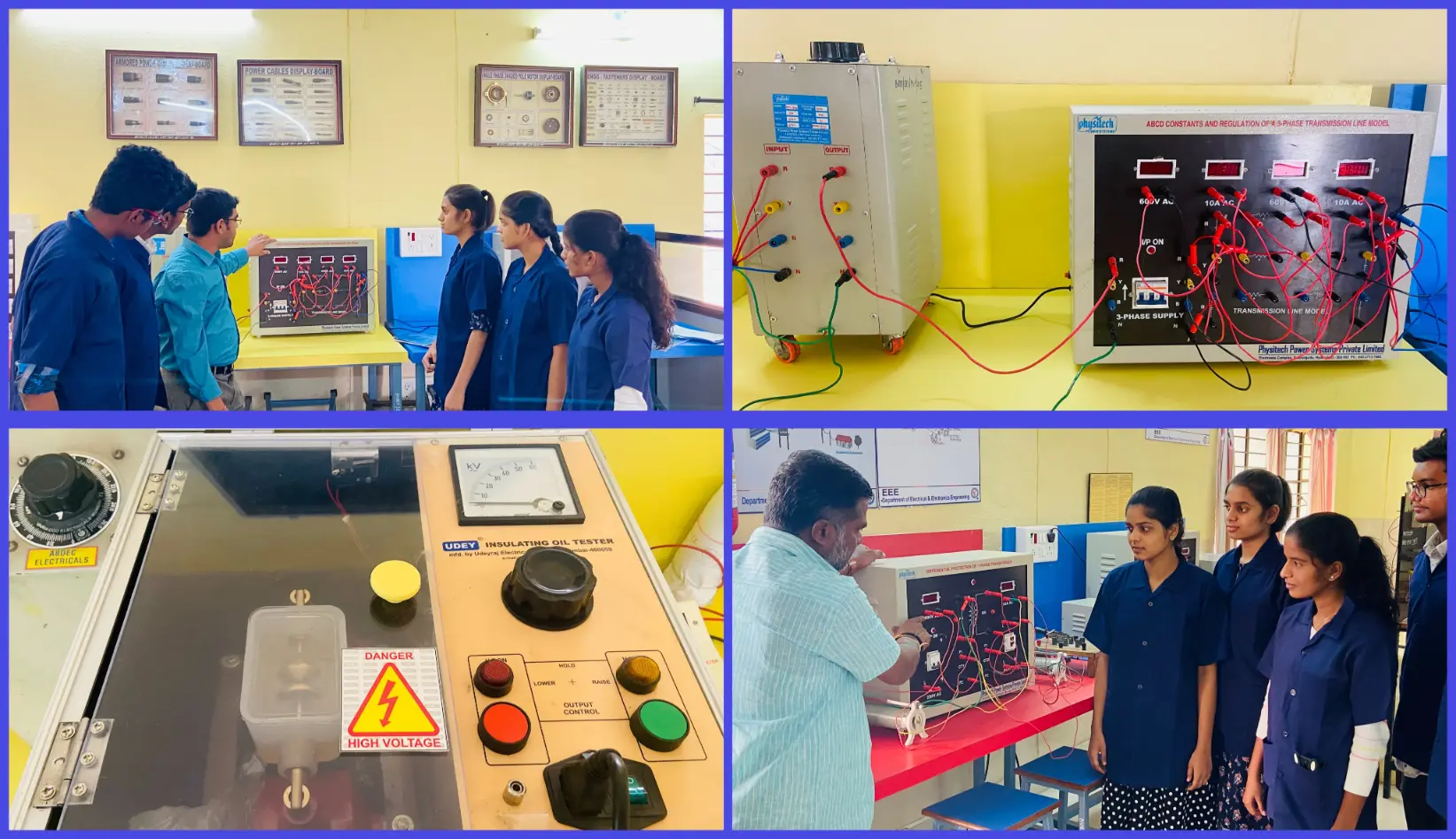
The Electrical Power Systems Laboratory has been set up mainly to teach the practical aspects of Power Systems Engineering to students.
The Power Systems-I Laboratory is working on constructing and implementing of a small-scale power system test-bed which has different capabilities for experimental research and educational purposes. This setup uses laboratory scale of power system components in order to model the realistic behaviour of a large power system. By having this type of power system, engineers and researchers are capable to implement their own idea about power system phenomenon in a practical way. It would be an excellent base not only for innovative research ideas, but also for teaching power system engineering concepts to students who are interested to get an overall idea of power system operation and the continual insertion of renewable resources.
Equipment:
- MG Set Consisting of Dc Shunt Motor With 3-Phase Alternator
- Three Phase Variac
- Tachometers – Digital
- Millivolt Drop Test Kit
- Tong Tester
- Transmission Line Simulator
- 100KVA Transformer With Regulation Unit
- Sphere-Sphere & Rod-Rod Gap
- Breakdown Strength of Oil Kit
- Suspension Type Insulators
- Power Angle Characteristics of A Salient Pole Synchronous Machine
- IDMT Over Current Relay Characteristics
- Megger- Measurement of Earth Resistance Using 3-Electrode Method
- Speed Control of DC Motor Using V/F Method
Faculty In-charge: B Ravindhar, Asst .Prof., EEE.
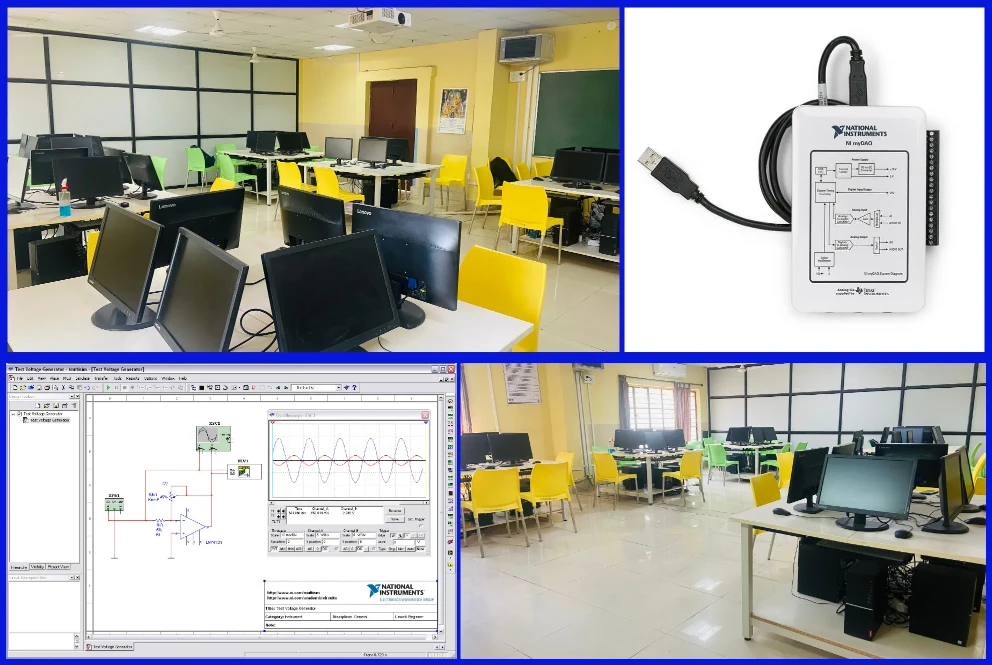
The Digilent myDigital accessory board for the NI myDAQ is designed to work in conjunction with myDAQ to provide students a cost-effective, portable, and engaging platform for teaching electronics. Along with NI Multisim the myDigital and myDAQ provide everything needed to allow students to design, construct, and test basic analog and digital designs.
Equipment:
- Multi-sim software,
- myDAQ trainer kit,
- myDAQ breadboard,
- Interfacing board,
- Desktop Computers.
Faculty Incharge: B Ravindhar, Asst. Prof., EEE.
Power system analysis lab is a computer model that mimics the operation of a real or proposed Power Engineering system. Simulation tool helps in validating the ideas and new concepts which born in an engineer’s mind which seeks for solution to a problem. Sophisticated Computer programs are used in Laboratory for the purpose of analysis.
Equipment:
This lab houses Computers with a Configuration of Core i3 processor, 2.4 GHz processor, 4GB RAM, 500 GB hard disk.
The lab is equipped with electrical system simulation software like MATLAB, SIMULINK, MULTISIM, Power Trans, Power Net and Power GIS. One can learn to solve various problems of electrical systems and study the stability by converting them to mathematical models. A complex system can be analyzed for optimization in a cost effective manner. Various tool boxes like Power System toolbox, Artificial Neural Networks tool box, Fuzzy Logic tool box, and Control Systems toolbox are also available for the students to train.
Faculty In-charge: K Mahesh, Assoc. Prof., EEE.
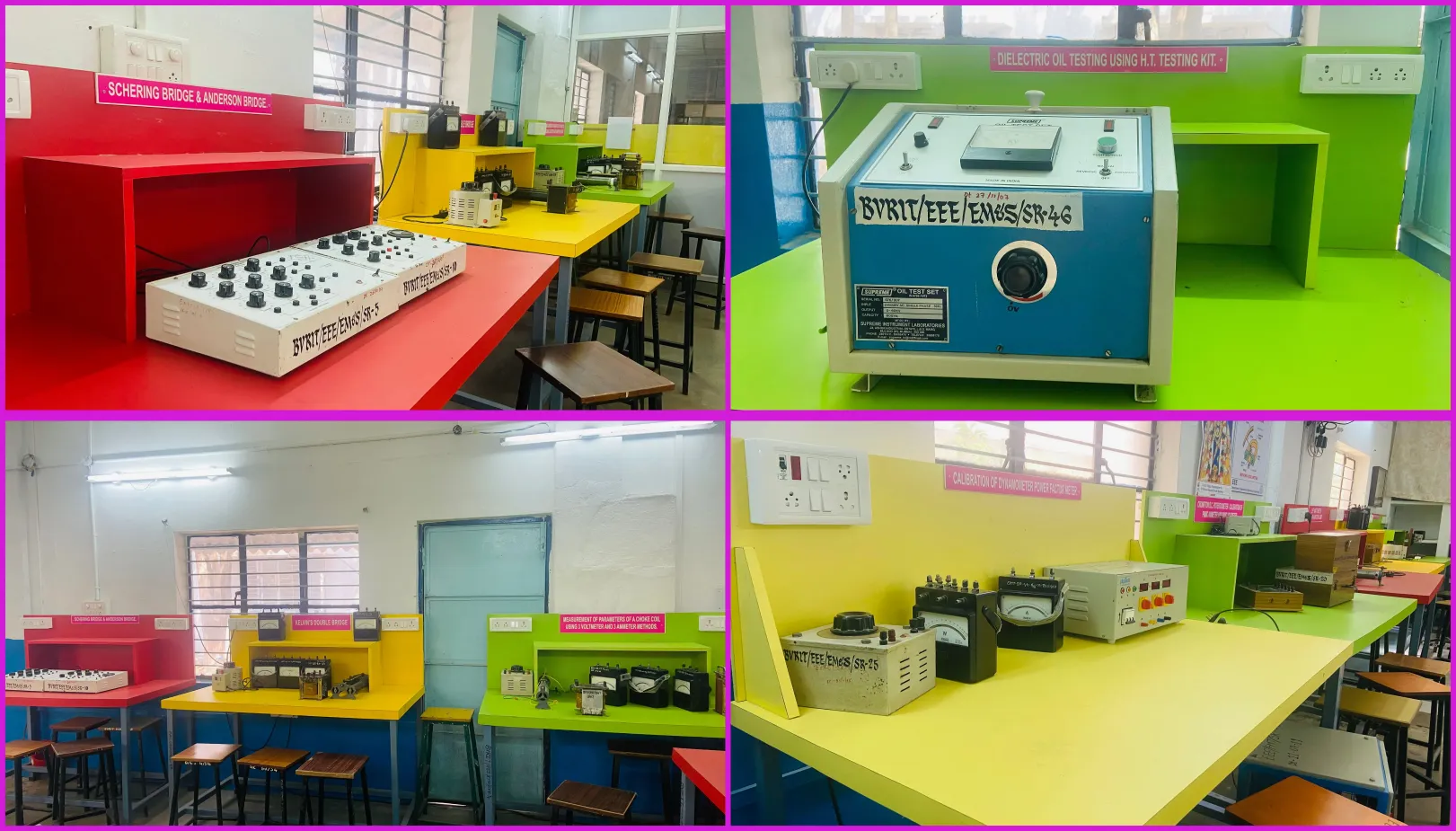
The laboratory is involved in all the areas of study, related to measurement and calibration. It is equipped with all measuring instruments, phase-shifting transformers, bridge circuits and induction coil etc. Here students learn to calibrate the meters, verify theorems, and understand hysteresis characteristics & other important concepts related to measuring.
Equipment:
Measurement of different electrical parameters such as voltage, current, power, energy, resistance, inductance, capacitance etc. are performed in Electrical Measurements laboratory. The constructional features of different indicating type instruments like PMMC, MI, Electro-dynamometer etc. are described in the instrument workshop. In addition to the measurement, calibration of instruments such as ammeter, voltmeter, wattmeter, energy meter etc. are performed in this laboratory. Measurement of current and voltage using instrument transformer is an important feature of this laboratory. Measurement of low resistance using Kelvin double bridge, and measurement of inductance and capacitance are performed using different ac bridge methods.
- Transformer oil testing unit
- AC & DC bridges
- Measuring Instruments
- Load banks
Faculty In-charge: Y Vijay Reddy, Asst. Prof., EEE.
Research Laboratories:
The ATL lab is also used as research laboratory for faculty and students’ management is giving funds for interdisciplinary projects in the institute. ATL provides a rich, authentic learning experience for students. It is a real time platform for the students to learn and experience engineering design process, to apply their academic skills in a real world, context, and to develop important workplace skills not usually taught in the classroom. ATL lab trains students and faculties in developing projects related to differently abled people and are presented in the competitions held at various other colleges.
- Training of students in installation of the PV modules, balance of systems and instruments. The measuring instruments used for this project use cutting edge technology and have been sourced by Elkem and Titan from leading vendors in the world. The performance of the modules in terms of energy generation and so on can be monitored from any part of the world. The Governments if India & Norway had signed a protocol some years ago for the promotion of various technologies including clean and green technologies. BVRIT as the academic partner has entered into a three way tie up with Elkem solar, Norway (Research partner) and Titan Energy Systems Ltd (Industry Partner). Elkem Solar, Norway, have developed solar grade silicon cells that are converted into photovoltaic (PV) module.
- Exposure of students to state-of-the-art technology in terms of PV modules, measuring instruments, sensors, data acquisition with associated software and evaluation techniques
- Developing the analytical skills of students by giving them an opportunity to involve themselves in a long-term performance study and interpret/analyze the data acquired
- An excellent paradigm for industry, academia and R&D collaboration – a Win-Win situation for all. Such an initiative would constitute the first step in establishing a full-fledged Centre of Excellence for Solar Energy at BVRIT.
